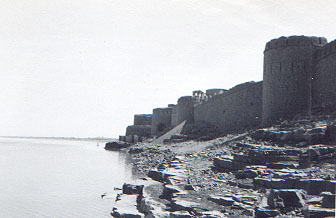|
Someswara
is credited with many victories including those
against the Cholas, Gangas and Chaulukyas.During his
reign Veera Siviasm flourished in full glory and
grandeur, giving it’s eight-fold path to eradicate
the miseries of it ‘s followers in particular and
people in general. The Epic called BASAVAPURANAM
was written during this period. This philosophy
attracted the masses, who accepted it with open arms
and thus the capital city of Bijjula, Kalyani became
the nerve center of Veera sivaism.
Someswara
died in 1177 AD and his brother Sankana who
succeeded him conquered many counties from Bengal to
Ceylon. During this period there was lot of
confusion about the Imperial Religion and the
conflict again broke between Siviates, Jains and
Vishanavites, supported by the Commander-in-chief of
Army.
Ahavamalla
succeeded Sankana in 1180 AD. He was great devotee
of Lord SIVA. He gave all the taxes collected from
Tumbala, Gogguru and Alampur Provenances in present
day Mahabubnagar and Kurnool District of Andhra
Pradesh (Andhra Pradesh,India) to the presiding
Deity of Srisalum i.e. Mallikarjuna Swamy
Devasthanam (Endowment Trust) i.e. Lord Siva. The
inscription to this effect is in Sanskrit and
earliest Telugu at Srisalum temple. Alampur was
called Brahmapuri, which was a very important
educational center called Brahamapuri Vidhyapeetam.
This center received rewards, grants and gifts from
various subsequent kings, queens and Emperors. The
famous pundits from this center are
Trilochanamuninadha and Ekantadesakadi.Details about
this are available in English and Telugu books sold
by the Srisalum Devasthanam Board at Srisalum
Temple. He subsequently lost large portion of Deccan
to Chalukya King Taila-III ' s Son Someswara IV.
Ahavamalla
still continued to rule small principality and was
succeeded by younger brother Singhana in 1183
AD, who later submitted to Chalukyas as his general
Barmideva or Brahma deserted and
went over to the service of Someswara IV, thus
putting an end to Kalachuri power in 1190 AD.
After 1190AD,the Empire of Kalayani split into three
parts, namely the kingdom of Devagiri founded by
Yadavas, the Kingdom of Warangal, governed by
Kakatiyas and the Kingdom of Dorasamudra ruled by
the Hoysalas.
Dadhi Reddi- The Ruler of Raichur,Alampur & Amangal.
Bijjala's sons i.e., Someswara and his brothers ,
who ruled the Deccan Plateau from 1168 AD to 1183 AD
lost the kingdom to the Chalukyas in 1183 AD. His
descendents were ruling small principalities between
River Krishna and Tungabadra for over 300 years
(1185 AD to 1500 Ad) . That was the time when
various Muslim rulers were gaining territories all
over the South India (Deccan). Their Descendent
(great......grand son) Dadhi who was the Commander
in chief of Bijapur army defeated Vijayanagar
Emperor's army and captured Raichur fort (1516 AD)
and its surrounding areas as Krishna Deva Raya's
armies were busy with Orissa campaign, and thus
winning the whole of Gajapathi's territory.
|
The
Nawab of Bijapur was pleased with his
expedition and told him that he would give
him all the area that he covers from sunrise
to sunset in any given day and was also
awarded a title called "REDDI".
Dadhi Reddi set off at Raichur fort in
the morning just before the sunrise and
covered area of Raichur, Amangal and Alampur
and reached the village of Panyagrahi
(Now Pallepad) before sunset on the same
day. As promised Bijapur Nawab had given
three taluks with Raichur as head quarters.
Thus, Dadhi Reddi had become an absolute
owner of men, material and land of the three
taluks. He was always at the
|

|
Service
of the Bijapur rulers whenever they needed his
services. Krishna Deva Raya lead an army of about
one million men and five hundred elephants and
pitched his camp to the east of Raichur and began
the seize of the Raichur fortress. Bijapur Nawab
came with relief of strong contingents of cavalry
and Krishna Deva Raya won a decisive battle and the
fort was captured after a very long seize with the
help of a Portuguese commander. He died fighting in
war at Raichur fort around 1520 AD, which is
inscribed in the fort rampant.
|

